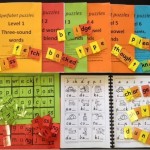Write this word backwards
3 Replies
Looking for a fresh early-level spelling activity? Inspired by the old board game “Backwords”, lately we’ve been having competitions to write words backwards.
For example, I say “write nip backwards” and learners have to write “pin”. This requires and builds awareness of the sounds in words (phonemic awareness) which is crucial for spelling.
Sometimes we use paper and pencil, and sometimes mini whiteboards, which are often somehow more exciting (novelty, I guess). For the hardline “I’m not picking up a pencil” brigade I also have an embarrassment of colourful and novelty pens and pencils, and coloured paper.
If working on four sound words, words like “spin” (nips) and “nuts” (stun) can be reversed.
If working in a group, children can take turns being the quiz master. When working with just one child, I ask the child’s parent to play too, and not-very-subtly encourage the parent to make a few mistakes, so that we end up with a grinning winner.
If keeping both letters and sounds exactly the same, this activity is limited to targeting two-letter vowel spellings in “oo” and “ee” words like “pool” and “keep”. A more difficult game would involve saying the word backwards, sound by sound, blending into a word, then writing the word, adjusting spelling choices as necessary e.g. club = /k/, /l/, /u/, /b/ becomes /b/, /u/,/l/,/k/ = bulk.
You can throw in a few palindromes for a laugh, like mum, dad, nan, pop, stats, noon, toot, peep and deed. Yup, same in both directions, pretty funny. There are even a few two-syllable ones like civic, level and madam.
Word choice is very important for this activity, because at least initially, you need words that are reversible in both their sounds and their spelling sequence. Here are some you might like to try:
3-sound |
4-5 sound |
oo vowel |
ee vowel |
|
bad-dab bag-gab ban-nab bat-tab bed-deb bin-nib bud-dub bun-nub bus-sub but-tub den-Ned dim-mid dog-god don-nod gal-lag gas-sag gum-mug gut-tug lap-pal nap-pan net-ten nip-pin nit-tin pat-tap |
bats-stab buns-snub buts-stub gulp-plug gums-smug maps-spam mets-stem nuts-stun pals-slap pins-snip pots-stop spat-taps spit-tips stats-stats |
doom-mood loop-pool noon-noon |
meet-teem (with life) peek-keep peels-sleep |
If working with beginners, I hope you can have some fun with this activity, and that it helps build your learners’ phonemic awareness and spelling skills.



Just a comment about mini whiteboards. I would have LOVED these as a child. Not as a novelty but for a very practical reason. Although I can read well, my handwriting and spelling are abysmal. My self esteem was crushed by the many red crosses that continually appeared in my exercise books. I would have loved to repeat the work, getting it correct and receiving the reward of a tick. But that never happened.
With a white board you can erase the mistake as if it never happened and get it right ! You are not a total failure your entire school life. So although they can be used inappropriately and overused, in some situations as Alison is suggesting here they can be fantastic. The child experiences success. Whiteboards are a good tool in this situation and that is probably why some children like them.
I love this exercise! Genius! I posted to my blog. Great job Alison! Also posted it on LinkedIn.
http://christinecalabrese.com/spelling-exercise-short-vowel-words/
My cousin is so good at this she is like a professional. MA!